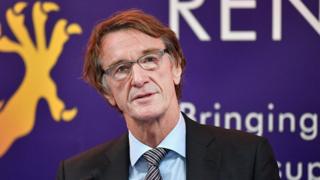Jim Ratcliffe: Turning cast-offs into gold
 Image copyright
Getty Images
Image copyright
Getty Images
The UK's richest man Jim Ratcliffe is the proud new owner of a high-profile professional cycling team, after his firm Ineos took over the former Team Sky.
The team will change its name to become known as Team Ineos mid-season, racing under its new name for the first time at the Tour de Yorkshire at the beginning of May.
The British-registered outfit had been seeking new funding after Sky said in December that it would end its ownership and sponsorship at the end of this year.
In many ways it is a familiar modus operandi for the man once called Dr No by trade unions for his tough negotiating stance.
Through buying up and turning around cast-off parts of other businesses, the Mancunian has made a £21bn fortune.
Private equity
From operations once owned by the likes of oil giant BP, Mr Ratcliffe has created a company whose chemicals and raw materials go into nearly everything we touch every day.
And it only took him 20 years to do it.
Mr Ratcliffe, 66, has always been involved in chemicals and industry.
After graduating with a degree in chemical engineering from the University of Birmingham in 1974, he spent a very brief spell at BP before jumping to rival oil business Esso as a trainee accountant.
Armed with an MBA from the London Business School, Mr Ratcliffe moved to fabric and chemicals producer Courtaulds before a career-changing step into the world of private equity when he joined Advent International in 1989.
Art of the deal
Advent served as a platform for Mr Ratcliffe to learn the cut and thrust of doing deals.
But after just three years, he was already making a leap into co-owning a business based on what would become a well-worn strategy.
He and fellow businessman John Hollowood decided to buy BP's chemicals division in Hythe, Kent for £40m in 1992.
By 1994, it was valued at £100m when it floated on the London Stock Exchange.
It was a high-risk move, Mr Ratcliffe admitted.
"I started the business in the days when you had to put all your worldly goods on the table," he told the London Business School in an interview.
"I had to put 100% of the equity that I owned at that stage on the line, so that was the house, savings and even the wife and children, which makes you very focused."
The business, Inspec, went on to acquire BP's speciality chemicals business in Antwerp, Belgium.
Mr Ratcliffe left Inspec to form his own firm, Ineos, in 1998 which bought the Belgian business for £89m.
Ineos is now worth £35bn, according to The Sunday Times Rich List - based on Mr Ratcliffe's strategy of buying "unfashionable or unsexy facilities owned by large corporations where you'd know they would be sloppy with the fixed costs".
From 181 sites across 22 countries, Ineos generates sales of around £45bn and employs 18,500 people.
Its raw materials are used in everything from packaging for toiletries, medicines and food, to mobile phones and furniture.
Because of his decision never to float the company and thus have no City shareholders to consult, Mr Ratcliffe, who owns 60% of Ineos, has been able to move quickly on deals.
In its first 10 years, Ineos bought more than 20 operations from huge companies such as German chemicals maker BASF, Dow Chemical of the US and ICI, once the biggest manufacturer in the UK.
Quadrupled sales
Arguably, the most important of these deals was Ineos's £5bn takeover of Innovene, BP's petrochemical business, in 2005.
Overnight, it quadrupled Ineos's sales to more than £18bn and doubled its staff numbers to 15,000.
Innovene also included the Grangemouth petrochemical plant and refinery in Scotland which, in 2013, became the scene of a tense stand-off with trade unions threatening strike action over pay and pensions.
The dispute - which earned Mr Ratcliffe the Bond villain moniker of Dr No - led to Ineos announcing that it would close the petrochemical plant and cut 800 jobs.
Shortly afterwards, Ineos reversed its decision when the Unite union agreed to a survival plan to invest £300m in the plant to keep it open.
Ineos continues to expand either through acquisitions such as buying the Forties Pipeline System from BP, which delivers 40% of the UK's North Sea oil and gas or through investment into controversial areas such as fracking.
Ineos has pledged to invest £650m in fracking and in 2016 created much fanfare around the arrival of the first shipment of shale gas from the US to arrive in the UK.
The company is locked in a legal battle with the Scottish government over its moratorium on fracking.
Meanwhile, Mr Ratcliffe took a surprising step away from chemicals when he announced plans to invest £600m to build a new vehicle based on the Land Rover Defender, which was discontinued in 2016.
Ineos then bought Belstaff, the luxury motorcycle wear maker whose jackets were once worn by actor Steve McQueen and modelled by the likes of David Beckham.
The company then acquired the Swiss football team FC Lausanne-Sport.
Whether or not these businesses could be classed as unloved is not certain, but Mr Ratcliffe clearly sees plenty of potential in them.